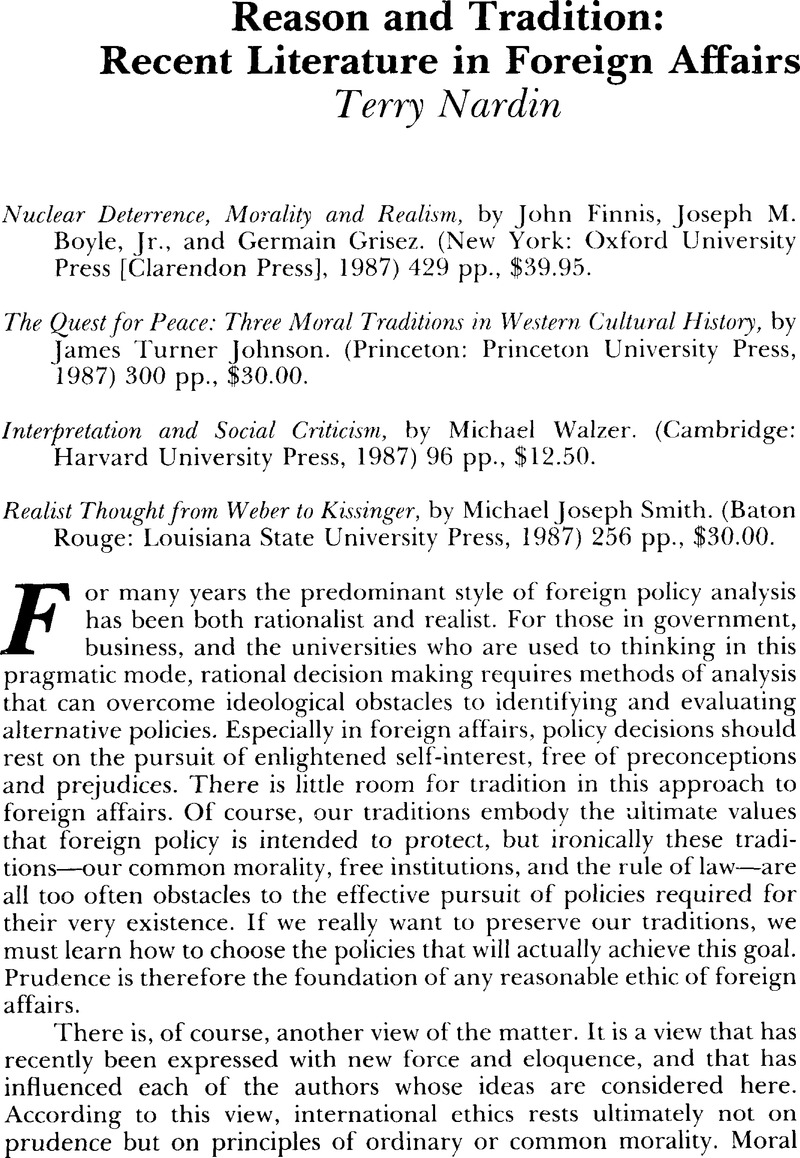Published online by Cambridge University Press: 28 September 2012

1 “Innocence” in this context does not mean absence of moral guilt, but rather that the persons deemed innocent are not engaged in the forcible violation, through crime or armed attack, of a community's just order (p. 86; see also chs. IV.4 and XI.5). In war, innocents are “noncombatants.” The policy of deterrence threatens those who pose no threat themselvesGoogle Scholar.
2 For example, they devote barely one page to the “reflexivity” of moral choice, a difficult and fundamentally important idea. Consequentialism is attacked more comprehensively, and with greater clarity, by Donagan, Alan in The Theory of Morality (Chicago: University of Chicago Press, 1977) ch. 6Google Scholar, and in Finnis's own Fundamentals of Ethics (Oxford: Clarendon Press, 1983) ch. 4Google Scholar.
3 More fully elaborated in Finnis, 's Natural Law and Natural Rights (Oxford: Clarendon Press, 1980)Google Scholar.
4 Ideology, Reason, and the Limitation of War and The Just War Tradition and the Restraint of War (Princeton: Princeton University Press, 1975 and 1981)Google Scholar.
5 For these topics, the standard works are still Schiffer, Walter, The Legal Community of Mankind (New York: Columbia University Press, 1954)Google Scholar and Hinsley, F. H., Power and the Pursuit of Peace (Cambridge: Cambridge University Press, 1963)Google Scholar. A more recent and very solid work on the theory and practice of confederation is Forsyth, Murray, Unions of States (New York: Holmes and Meier, 1981)Google Scholar.
6 Especially Can Modern War Be Just? (New Haven: Yale University Press, 1984).
7 See, for example, Beitz, Charles R., Political Theory and International Relations (Princeton: Princeton University Press, 1979)Google Scholar and. more recently, Fain, Haskell, Normative Politics and the Community of Nations (Philadelphia: Temple University Press, 1987)Google Scholar.
8 Kennedy, Robert F., Thirteen Days (New York: Norton, 1971) pp. 16–17Google Scholar.
9 The Twenty Years' Crisis, 1919–1939 (London: Macmillan, 1939; 2d ed., 1946)Google Scholar.
10 Scientific Man vs. Power Politics (Chicago: University of Chicago Press, 1946) pp. 203–4Google Scholar.
11 In Defense of the National Interest (New York: Knopf, 1951) p. 39Google ScholarPubMed.
12 Kennan, George F., Memoirs, 1925–1950 (New York: Pantheon, 1967) p. 199Google Scholar.